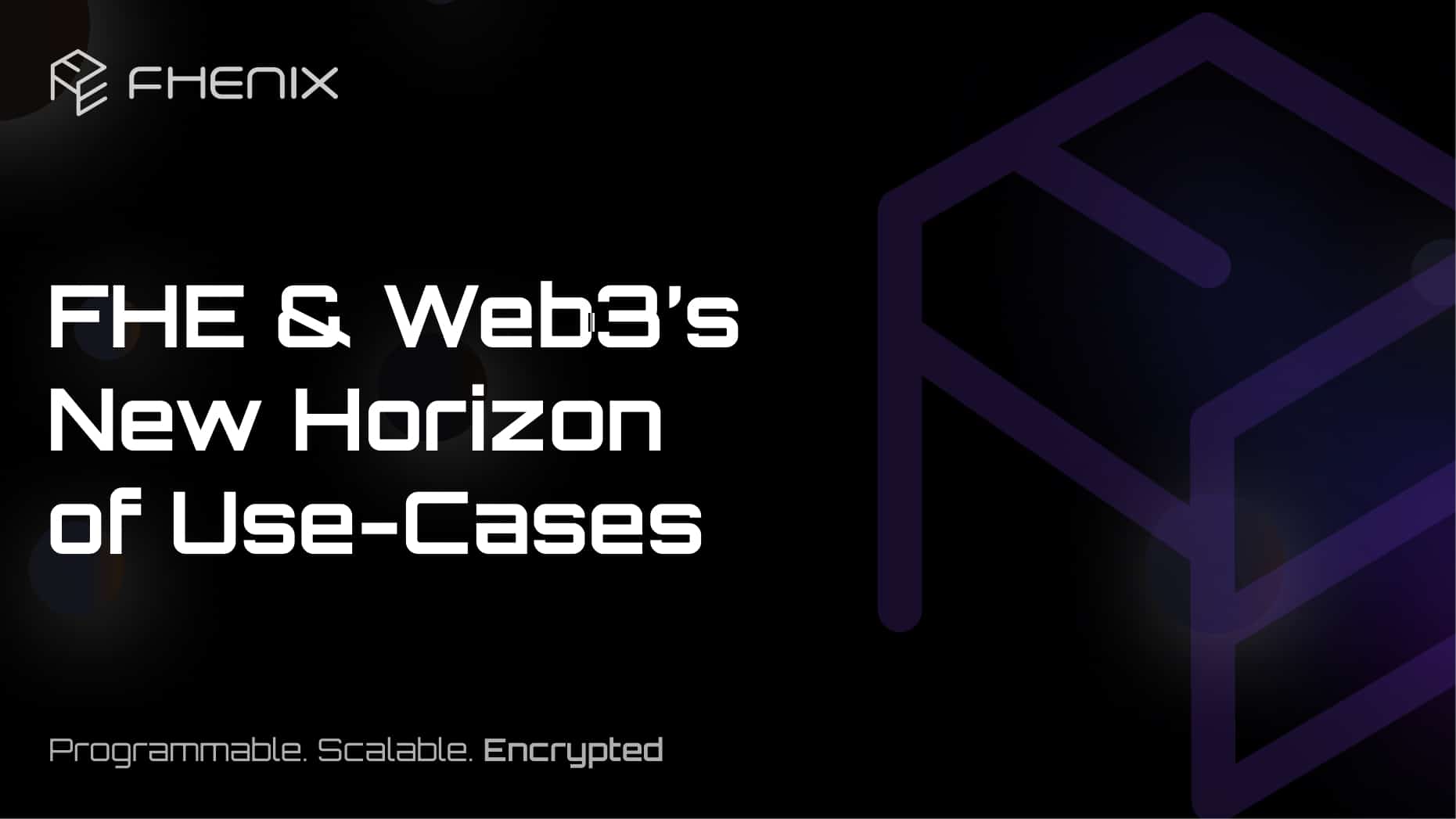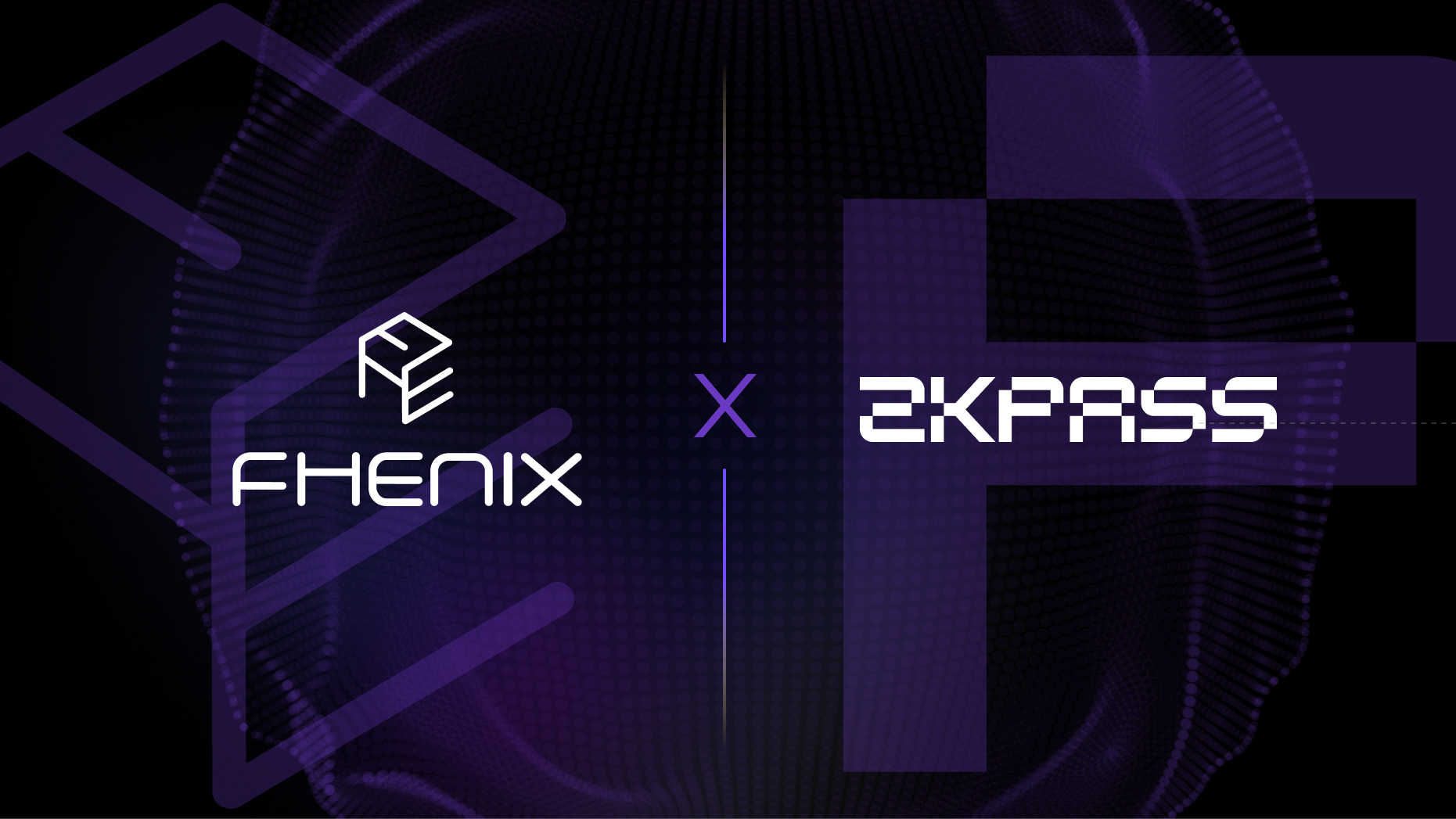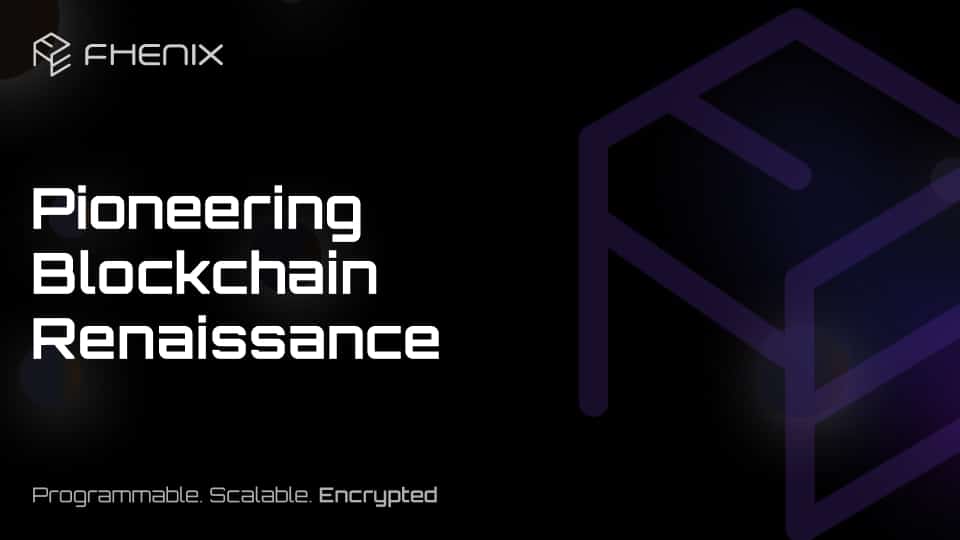
Date: 04-02-24
FHE & Web3’s New Horizon of Use-Cases
TLDR:
- There are 7 areas of blockchain that are limited by blockchain’s innate transparency. This list is only growing, and Fhenix’s ability to incorporate Fully Homomorphic Encryption (FHE) on-chain is key to enabling privacy-centric use cases.
- Confidential Transactions are important for payments, voting, medical records, and other sensitive data. FHE keeps all data private and secure.
- On-chain auctions, ranging from traditional bids to DeFi liquidations, governance decisions, and token sales, can be fully private and secure, protecting bidder data and ensuring the auction’s integrity.
- Confidential Voting is important for maintaining voter privacy, limiting manipulation, and adhering to regulatory compliance laws.
- Encrypted Gaming has all state updates done on-chain while hiding player data (such as their holding or historical strategies), and secures in-game transactions.
- Decentralized Identities are on-chain identifiers that require control over one’s personal data, secure encryption and interoperability, and secure authentication.
- MEV Protection can be implemented by having all mempool transactions encrypted, preventing front-running and ensuring fairness over transaction ordering.
- Privacy-preserving AI keeps all data private, secure and on-chain, all the way from the model’s training data to the actual results.
Introduction:
Transparency is a core strength of blockchain, but also limits vital use cases needed to scale the industry to a global level.
For example, institutional use cases such as payments tend to revolve around sensitive data not suitable for the blockchain. Additionally, sophisticated bots are continuously monitoring public data for potential network exploits network.
We foresee 7 areas that benefit from on-chain encryption:
- Confidential Transactions
- On-Chain Auctions
- Confidential Voting
- Encrypted Gaming
- Decentralized Identity
- MEV Protection
- Privacy-Preserving AI
The number of counterparties and the strength of on-chain analytical tools and bots will only increase, meaning that having built-in privacy and security is paramount.
In this article, we’ll cover all core use cases enabled through FHE Rollups, custom-built Layer 2’s with confidentiality built-in from the core.
1. Confidential Transactions
Blockchain’s innate transparency imposes many limitations on potential use cases and adoption by exposing sensitive transaction details. Payments, voting, medical records, one’s financial history, and many other use cases require confidentiality, and the list will only expand alongside blockchain adoption. By enabling confidential and yet auditable transactions to take place on-chain, both consumer and corporate users of the blockchain users can benefit greatly.
Benefits include:
- Privacy protection: complete privacy over user identities, transaction amounts, and other sensitive information. This not only protects the mempool (encrypted state), but also the fields used to advance the networks state (encrypted transit).
- Enhanced security: transactions remain tamper-proof and private throughout the entire process.
- Preventing manipulation and front-running: full transaction privacy reduces the potential for unethical practices while ensuring fair transaction processing.
- Regulatory compliance: easy alignment with data protection and privacy laws, regardless of jurisdiction.
2. On-Chain Auctions
On-chain auctions, ranging from traditional bids to NFT marketplace offerings, DeFi liquidations, governance decisions, and token sales, can significantly benefit from Fhenix’s confidential smart contracts. These contracts allow users to place encrypted bids, maintaining anonymity and fairness without exposing personal data or sensitive bid details. Upon the auction’s closure, only the winning bids are disclosed, an approach especially valuable for high-stake or sensitive transactions involving premium items or significant financial decisions.
Benefits include:
- Encrypted Bids: Bids are encrypted to ensure confidentiality and prevent exposure during the auction process.
- Full Smart Contract Functionality: An automated auction process with full confidentiality, including bid submission, validation, and winner selection.
- Reveal Mechanism: Secure reveal winning bids at the auction’s conclusion without compromising the integrity of the process.
- Privacy-Preserving Protocols: Maintain confidentiality of participants’ identities, bid amounts, and other confidential information.
3. Confidential Voting
On-chain voting is critical for Decentralized Autonomous Organization (DAO) voting, as well as for consensus mechanisms and any other forms of on-chain voting where confidentiality and security are needed.
Projects using Fhenix’s FHE can vote with complete confidentiality, while the system knows that their votes are entirely valid. FHE’s stringent security & privacy characteristics also make it regulatory compliant, enabling voting even in high-stakes environments, such as governmental elections.
Benefits include:
- Voter Privacy: This protects voters from external influence or coercion, and safeguards their privacy.
- Security: Encryption makes it challenging for attackers to trick the system, study voter patterns, or manipulate the system in any manner.
- Regulatory Compliance: Adherence to election laws and privacy regulations, especially critical for important vote situations.
4. Confidential Gaming
Multiplayer Web3 games face various challenges caused by the blockchain’s transparency, including exposing real-time positions, analyzing historical strategies, in-person identity correlation, and other forms of potential manipulation. For example, on-chain poker is challenging as all cards are publicly visible and the game can be manipulated.
With FHE, developers can integrate confidentiality into Web3 games, keeping all data entirely confidential while still updating the blockchain’s state after each move.
Benefits include:
- Securing In-Game Transactions: Public blockchain records enable opponents to analyze past strategies and pending moves or to manipulate the game such as through front-running actions. Encrypting both financial transactions and player actions protects against real-time manipulation.
- Protecting Player Data: Player data, such as financial assets and personal information, can be discoverable and expose them to phishing attacks and real-world security risks. Encryption anonymizes player activity, reducing these risks.
- Transparent State Updates: Existing solutions such as ZKPs have transactions processed off-chain and only periodically updated on-chain. FHE has all in-game actions encrypted on-chain, yet verifiable via decryption.
5. Decentralized Identity (DiD)
Decentralized Identity (DID) represents an on-chain identifier facilitating a secure and verifiable digital identity. This approach ensures that an individual’s identity remains self-owned and isn’t subject to control by a central authority.
DiD at its core holds sensitive personal data that will be targeted by malicious parties. On-chain FHE enables the secure storage and verification of encrypted user data, while also providing selective disclosure and control over key parameters.
Benefits include:
- Control Over Personal Data: Selective disclosure over identity attributes, for example, proving citizenship while ensuring all other details remain fully secure.
- Secure Authentication: Traditional identity systems are frequently subject to data exploits. Fhenix protects login credentials and authentication tokens from being intercepted or duplicated.
- Interoperability and Data Portability: DIDs operate across various platforms and services. Encryption ensures that while this data is portable and interoperable, it remains confidential and can only be accessed by entities with the appropriate decryption capabilities.
6. MEV Protection
Pending blockchain transactions are publicly visible in the network’s mempool, which can lead to value extracted through methods such as front-running or sandwich attacks. For example, a pending profitable transaction could be front-run by another party submitting the same transaction with a slightly higher gas fee paid. This is known as Maximal Extractable Value (MEV) and it’s a hidden tax.
This is easily preventable through Fhenix’s built-in confidentiality, whereby pending transaction data is kept confidential.
Benefits include:
- Preventing Front-Running and Exploitation: By having the public data of all transactions encrypted and hidden from those monitoring the mempool, MEV bots to cannot engage in front-running, sandwich attacks, or other predatory practices.
- Ensuring Transactional Fairness: Block proposers cannot view transaction data, therefore prioritizing based on network rules rather than personal gain.
- Protecting Against Censorship: An inability for block builders to censor transactions.
7. Privacy-Preserving A.I.
The application of A.I. is expanding rapidly across various sectors, utilizing extensive amounts of data to perform intricate computations. FHE allows AI models to process encrypted data, enabling the use of sensitive personal or financial information in AI computations securely, without privacy or security risks.
For example, Ethereum Founder Vitalik Buterin’s recent blog post covered how the overhead cost of putting AI inside cryptographic boxes is quite low, and FHE is a viable solution to this.
Additionally, Zama recently updated their Concrete-ML library to add the ability to train data using an encrypted ata set. They also plan to make have their Concrete-ML library be compatible with TFHE-rs ciphertexts, which is their Rust implementation of the TFHE (Zama’s variation of FHE).
The result is that quick advancements are being made when it comes to privacy-preserving AI on-chain, and that languages and libraries will be increasingly easy for developers to use.
The main implications are:
- Data Privacy: A.I. models can use fully encrypted training data, while ensuring that it remains encrypted until it reaches its intended destination.
- Security: Full encryption prevents unauthorized access or data manipulation.
- Regulatory Compliance: Facilitates adherence to stringent data protection regulations in AI applications.
Implementing FHE
Given that there are so many ways that a project may benefit from the integration of FHE into one’s workflow, how can they get started?
Fhenix’s FHE Rollups enable developers to craft custom application chains with built-in FHE capabilities while using well-known EVM languages such as Solidity. This applies to all of the categories explored above, such as networks that are MEV-resistant, built for DiD, have a full privacy-focused gaming ecosystem, and much more.
Developers can easily deploy any custom-purpose Layer 2 with privacy, security, and compliance built-in from the core, while knowing that transactions are auditable if need be.
Fhenix’s mission is to usher in a new era of computing, prioritizing privacy and security, and ultimately eliminating data breaches while maintaining confidentiality and data integrity for all.
Those interested may visit our website at fhenix.io to learn more.


